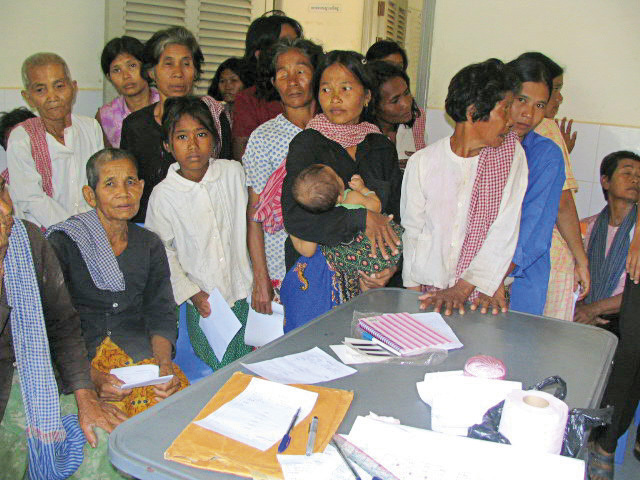
អ្នកជំងឺចុះឈ្មោះ ក្នុងអំឡុងពេលពិនិត្យព្យាបាលនៅមណ្ឌលសុខភាពវៀន។ រូបថត ថតដោយសហគមន៍សុខភាពភ្នែក នៅឆ្នាំ២០០៦។ ក្រោមអាជ្ញាប័ណ្ណ CC BY-NC 2.0
ព្រះរាជាណាចក្រកម្ពុជា គឺជារដ្ឋមិនអាចំបែកបាន។ រដ្ឋបាលគ្រប់គ្រង នៅគ្រប់លំដាប់ថ្នាក់ និងនៅគ្រប់វិស័យ ជាទូទៅ គឺស្ថិតនៅក្រោមដំបូលតែមួយនៃរដ្ឋាភិបាលជាតិ ។ រដ្ឋបាលមូលដ្ឋាន មិនមានស្វ័យភាពដាច់ខាតពីរដ្ឋាភិបាលជាតិទេ។ ឧទាហរណ៍ ខណៈដែលពន្ធដារ និងគយ រូបិយប័ណ្ណ និងយោធា គឺជាអំណាចរបស់រដ្ឋាភិបាលជាតិ គ្មានអាជ្ញាធរនិងរដ្ឋបាលមូលដ្ឋានណា អាចធ្វើច្បាប់ និងផ្តល់យុត្តិធម៌ដល់ប្រជាជន ក្រៅតែពីសភា និង តុលាការ ទេ។
រដ្ឋបាលមូលដ្ឋាន ត្រូវបានត្រួតពិនិត្យដោយរដ្ឋាភិបាលជាតិតាមរយៈក្របខណ្ឌស្ថាប័ន និងច្បាប់។ នៅតាមកំរិតនៃរដ្ឋបាលដែនដីនីមួយៗ មន្ទីរ និងសាខាខេត្តនិងរាជធានី នៃក្រសួងរាជរដ្ឋាភិបាល នៅរួមរស់ជាមួយនឹងអភិបាល ហើយពួកគេទាំងពីរតំណាងឱ្យក្រសួងរាជរដ្ឋាភិបាល និងរដ្ឋាភិបាលកណ្តាល ដែលជាអង្គនីតិប្រតិបត្តិ។ លើសពីនេះ ខណៈដែលសាលាដំបូងមានទីតាំងនៅតាមបណ្តាខេត្ត និងរាជធានី សេចក្តីសម្រេចរបស់តុលាការទាំងនេះ ជាធម្មតា អាចនឹងត្រូវធ្វើ ជាកម្មវត្ថុនៃបណ្តឹងឧទ្ធរណ៍ នៅចំពោះមុខតុលាការជាន់ខ្ពស់ (មើល ប្រព័ន្ធច្បាប់និងប្រព័ន្ធតុលាការ)។ ម្យ៉ាងវិញទៀត ដីការបស់ក្រុមប្រឹក្សានៃរដ្ឋបាលមូលដ្ឋាន មានឋានានុក្រមទាបជាង អនុក្រឹត្យចេញដោយនាយករដ្ឋមន្ត្រី ដែលជាប្រមុខនៃអង្គនីតិប្រតិបត្តិ និងច្បាប់អនុម័តដោយសភា (មើល ក្របខណ្ឌច្បាប់)។
អាជ្ញាធរគ្រប់លំដាប់ថ្នាក់នៃរដ្ឋបាលដែនដី អាចបំពេញភារកិច្ចតែនៅក្នុងក្របខណ្ឌនៃយុត្តាធិការ និងហិរញ្ញវត្ថុផ្តល់ឱ្យប៉ុណ្ណោះ។ ជាទូទៅ វិស័យរបស់រដ្ឋបាលមូលដ្ឋាន មិនអាចទៅហួសពីវិស័យរបស់រដ្ឋាភិបាលជាតិទេ។ ឧទាហរណ៍ ក្រុមប្រឹក្សារាជធានី ខេត្ត ក្រុង ស្រុក ខណ្ឌ មិនអាចសម្រេចបណ្តឹងលែងលះ អំពើហិង្សាក្នុងគ្រួសារធ្ងន់ធ្ងរ បទល្មើសមជ្ឈឹមនិងឧក្រិដ្ឋ និង បណ្តឹងនៅតុលាការ បានទេ។1 ចំណូលរបស់រដ្ឋបាលថ្នាក់ក្រោមជាតិ បានមកពីចំណូលនៃការផ្តល់សេវា ពន្ធដារ និង វិភាគនៃកញ្ចប់ថវិកា ជាតិយល់ព្រមដោយសភា។2
ចាប់តាំងពីចុងទស្សវត្សរ៍ឆ្នាំ១៩៩០ រដ្ឋាភិបាលជាតិ បានធ្វើប្រតិភូកម្មអំណាចកណ្តាលរបស់ខ្លួន ជាបណ្តើរៗ មករដ្ឋបាលមូលដ្ឋាន។ ជាមួយនឹងការប្រកាសឱ្យប្រើច្បាប់ស្តីពីការគ្រប់គ្រងរដ្ឋបាលឃុំ-សង្កាត់ នៅឆ្នាំ២០០២ លំដាប់ទាបបំផុតនៃរដ្ឋបាលដែនដី បានក្លាយជានីតិបុគ្គលឯករាជ្យពី រដ្ឋាភិបាលជាតិ។ នេះ បានន័យថា ឃុំ និងសង្កាត់ មានធនធាន ថវិកា កម្មសិទ្ធិ និង រដ្ឋបាលគ្រប់គ្រងផ្ទាល់ខ្លួន។ ជាពិសេស ក្រុមប្រឹក្សាឃុំ-សង្កាត់ ដែលជាអង្គភាពគ្រប់គ្រង មានសមាជិកដែល ត្រូវបានបោះឆ្នោតជ្រើសតាំងដោយផ្ទាល់ពីប្រជាជននៅក្នុងមូលដ្ឋាននោះ (មើល ការគ្រប់គ្រង)។
នៅឆ្នាំ២០០៨ រដ្ឋបាលដែនដី ទទួលបានស្វ័យភាពកាន់តែច្រើនជាសន្សឹមៗពីរដ្ឋាភិបាលជាតិ។ យោងទៅតាមច្បាប់ស្តីពីការគ្រប់គ្រងរដ្ឋបាលរាជធានី ខេត្ត ក្រុង ស្រុក និង ខណ្ឌ រដ្ឋបាលដែនដី នៅគ្រប់កំរិត គឺជានីតិបុគ្គលដែលមានឯករាជ្យភាពខាងថវិកា និងរដ្ឋបាលមួយចំនួន។ សេវា និង ភារកិច្ចខ្លះ ដែលក្រសួងរដ្ឋាភិបាលជាធម្មតាតែងតែបំពេញ កំពុងត្រូវបានផ្ទេរអាណត្តិជាបណ្តើរៗ ទៅឱ្យរាជធានី ខេត្ត ក្រុង ស្រុក និង ខណ្ឌ។ ហេតុដូចនេះ ធនធានរបស់រដ្ឋាភិបាលជាតិ ក៏ត្រូវ រំលែកមករដ្ឋបាលមូលដ្ឋាន ទៅតាមសមាមាត្រនៃភារកិច្ចដែលផ្ទេរចុះមកផងដែរ (មើល វិមជ្ឈការ និងវិសហមជ្ឈការ)។
នៅពេលអនាគតដ៏ខ្លីខាងមុខនេះ រដ្ឋបាលថ្នាក់ក្រោមជាតិ នឹងមានស្វ័យភាព និងអំណាចកាន់ តែច្រើនជាងមុន នៅក្នុងការគ្រប់គ្រងកិច្ចការមូលដ្ឋាន និងបុគ្គលិករបស់ខ្លួន។ នៅខែមិថុនា ឆ្នាំ២០១៣ ជាមួយនឹងការធ្វើវិសោធនកម្មច្បាប់ស្តីពីការរៀបចំ និងការប្រព្រឹត្តទៅនៃគណៈរដ្ឋមន្ត្រី រដ្ឋាភិបាលជាតិ បានបង្ហាញសារយ៉ាងច្បាស់ថា មន្ត្រីរាជការនៃក្រសួង និងស្ថាប័នជាតិ ដែលបំពេញភារកិច្ចនៅថ្នាក់ក្រោមជាតិ នឹងត្រូវគ្រប់គ្រង តែងតាំង ជំនួស និងបណ្តេញចេញពី ភារកិច្ច ដោយរដ្ឋបាលថ្នាក់ក្រោមជាតិ។3 ប្រសិនបើករណីនេះកើតឡើង នោះមានន័យថា ពួកគេ លែងនៅរួមរស់ជាមួយនឹងរដ្ឋបាលមូលដ្ឋានហើយ ប៉ុន្តែស្ថិតនៅក្រោមការចាត់ចែងគ្រប់គ្រងតែម្តង។
ទាក់ទងនឹងរដ្ឋបាលមូលដ្ឋាន
បច្ចុប្បន្នភាពចុងក្រោយ ថ្ងៃទី ២៤ ខែកញ្ញា ឆ្នាំ២០១៥

